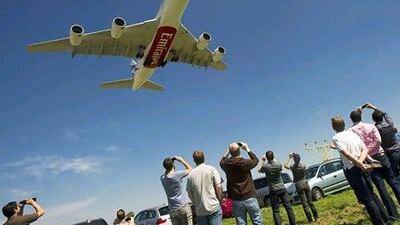Emirates Airline doubled its half-year profits despite facing a volatile global economic environment and consistently high fuel prices.
The airline achieved net profits of Dh1.7 billion (US$4.63 million) in the six months up to September 30, up 104 per cent from Dh836m in the same period last year, after it flew more passengers, more cheaply across its network.
Emirates Group, which includes the ground-handling unit dnata, posted net profits of Dh2.1bn, up 68 per cent from Dh1.3bn.
"The Emirates Group half-year performance is the result of hard work and our drive to stay on course and continue to grow despite the precarious marketplace," said Sheikh Ahmed bin Saeed Al Maktoum, the chairman and chief executive of Emirates Group.
"We have continued to invest in the infrastructure of both Emirates and dnata and it continues to pay off."
Revenue and other operating income for the group was Dh38.2bn, an increase of 16 per cent, as the airline benefited from greater occupancy across its flights.
Revenue including other operating income for dnata was Dh3.9 bn in the period, up 9 per cent on Dh3.6bn last year.
The airline's revenue was Dh35.4bn, up 17 per cent compared with Dh30.2bn recorded in the first six months of its last fiscal year.
It carried 18.7 million passengers in the six-month fiscal period, up 15.4 per cent from the same period last year. Seat factor, a measure of occupancy across the Emirates fleet of planes, increased to 80 per cent, up from 79 per cent in the same period last year.
Soaring fuel prices plagued the Dubai carrier's results for the past financial year, causing it to suffer a 72 per cent decline in profits as jet fuel prices added an extra $1.6bn to costs.
"Emirates remained focused on its growth and global expansion despite ongoing fluctuating exchange rates and ever-lingering high fuel prices which accounted for 39 per cent of our expenditures, down 2 percentage points from last year," said Sheikh Ahmed.
"The instability in the market over the past six months has put Emirates to the test, and once again we have risen to the challenge. Our results speak for themselves."
The growth of Arabian Gulf airlines, spearheaded by Emirates, continue to outpace that of other carriers around the world.
In the low-cost space, Air Arabia reported a doubling of profits yesterday for the third quarter.
For the three months ending September 30, net profits at the budget airline increased 126 per cent to Dh226m from Dh100m in the corresponding period last year.
The industry has undergone a major shift this year as legacy carriers have embraced Gulf airlines - Emirates, Etihad Airways and Qatar Airways - through various partnerships and alliance tie-ups.
In September, Emirates and Qantas signed a landmark deal to route the Australian carrier's flights to Europe through Dubai rather than Singapore.
Demand for Middle East airlines rose 13.3 per cent year-on-year in September compared with worldwide demand for passenger traffic of just 4.1 per cent above levels in September last year, according to the International Air Transport Association (Iata) global traffic returns.
Moreover, last month, Iata upgraded this year's anticipated global airlines earnings to $4.1bn from its June forecast of $3bn, driven by Middle East carriers.
"The power of the Dubai hub cannot be underestimated for Emirates," said John Strickland of JLS Consulting, based in London. "Having a hub in the Middle East is a great position."
He added that Emirates was now offering one of the most modern fleets and greatest connectivity of any airline in the world.
Emirates now flies to 126 destinations, up from 114 last year, in 74 countries compared with 67 last year, making it one of the world's biggest airlines.
It received 13 wide-body aircraft in the first six months of its fiscal year, including two A380s and 10 Boeing 777s, and has more than 15 new aircraft scheduled to be delivered before the end of the financial year, which closes at the end of March.
The airline has launched five destinations since the beginning of April, including Ho Chi Minh City, Barcelona, Lisbon, Erbil and Washington DC.
New routes to be added during the second half of the fiscal year include Adelaide, which launched on November 1, and Lyon, Phuket, Warsaw and Algiers.
The Emirates Group grew its staff base 8 per cent in six months to nearly 68,000 and its cash position as at September 30 was Dh15.2bn compared with Dh17.6bn at the end of March.
The Dh2.4bn difference in the cash balance was predominantly as a result of the group repaying a Dh2bn sukuk bond in June.

